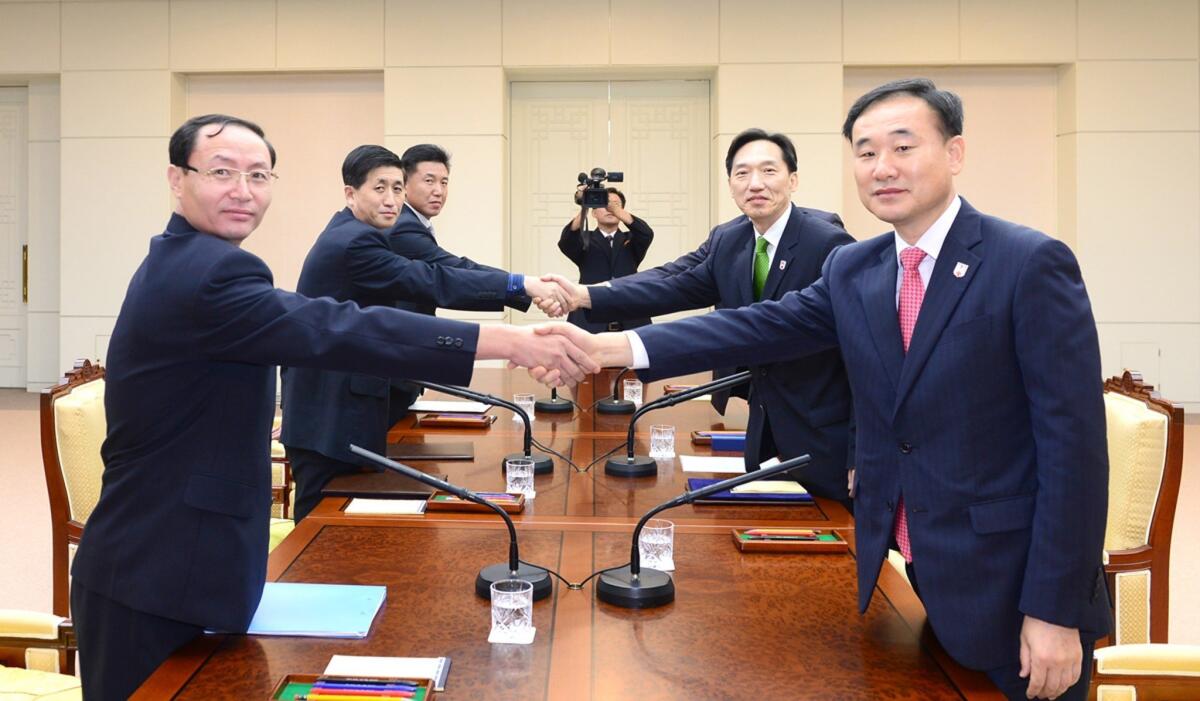Koreas agree to hold reunions of war-divided families

South and North Korean delegates shake hands at the truce village of Panmunjom at the Demilitarized Zone separating the two Koreas. The two countries agreed to hold a reunion in October for families separated by the 1950-53 Korean War.
Reporting from Seoul, South Korea — North and South Korea agreed Tuesday to hold reunions next month of families separated by the Korean War in the early 1950s, a small but important bit of progress for rivals that just last month were threatening each other with war.
One hundred mostly elderly people from each country will be reunited with relatives Oct. 20-26 at the Diamond Mountain resort in North Korea, according to Seoul’s Unification Ministry and North Korean state media.
The decision came after overnight talks among the Koreas’ Red Cross officials at the border village of Panmunjom that began Monday. The Koreas initially agreed to push for the reunions after striking a deal last month to ease a standoff that had flared after a mine explosion blamed on Pyongyang maimed two South Korean soldiers.
The highly emotional reunions have not happened since early last year. But even Tuesday’s announcement doesn’t guarantee success. The rivals have a long history of failing to follow through on reconciliation efforts.
Planned reunions in 2013 were scrapped at the last minute because of North Korean anger in part over its claim that the South was trying to overthrow Pyongyang’s government.
Most applicants are in their 70s or older and desperate to see their loved ones before they die. Many Koreans don’t even know whether relatives on the other side of the border are still alive because their governments mostly ban the exchange of letters, phone calls or emails.
Some foreign analysts also remain skeptical about inter-Korean ties because of speculation that North Korea will fire what it calls a satellite to celebrate the 70th birthday of its ruling party Oct. 10. Similar launches have triggered international standoffs as South Korea and other neighboring countries called them disguised tests for long-range missiles. Such a launch would endanger the reunions.
About 22,500 Koreans had participated in brief reunions — 18,800 in person and the others by video — during a period of detente. None were given a second chance to meet their relatives, according to South Korea’s Red Cross.
South Korean officials have long called for holding reunions more regularly and expanding the number of people taking part. North Korea is seen as worrying that doing so could open the country to influence from more affluent South Korea and threaten the ruling party’s grip on power.
During the talks, South Korea reiterated its demands that both countries regularize reunions, and allow separated family members to check whether their loved ones are still alive and exchange letters. North Korea wanted to focus on next month’s reunion, chief South Korean negotiator Lee Duk-haeng told reporters in a televised briefing.
Lee said the countries agreed to try to resolve the issue of separated families and hold Red Cross talks again soon.
The two Koreas remain divided along the world’s most heavily fortified border since the 1950-53 Korean War ended with an armistice rather than a peace treaty.
MORE WORLD NEWS
After ‘military parade blue’ skies, pollution returns to Beijing
10 dead, 8 missing after South Korean fishing boat capsizes
China’s troop-cut plan is more about modernization than peace, analysts say
More to Read
Sign up for Essential California
The most important California stories and recommendations in your inbox every morning.
You may occasionally receive promotional content from the Los Angeles Times.










